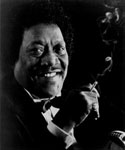Glossary entry for
Bland, Bobby "Blue"
 Excerpted from Music Central:
Excerpted from Music Central:
Bobby "Blue" Bland (born Robert Calvin Bland, 27 January 1930, Rosemark, Tennessee, USA). Having moved to Memphis with his mother, Bland started singing with local gospel groups there, including amongst others the Miniatures. Eager to expand his interests, he began frequenting the city's infamous Beale Street where he became associated with an ad hoc circle of aspiring musicians named, not unnaturally, the Beale Streeters. Bobby's recordings from the early '50s show him striving for individuality, but any progress was halted by a spell in the US Army. When the singer returned to Memphis in 1954 he found several of his former associates, including Johnny Ace, enjoying considerable success, while Bland's recording label, Duke, had been sold to Houston entrepreneur Don Robey. In 1956 Bland began touring with Little Junior Parker. Initially he doubled as valet and driver, a role he reportedly fulfilled for B.B. King, but simultaneously began asserting his characteristic vocal style. Melodic big-band blues singles, including "Farther Up The Road" (1957) and "Little Boy Blue" (1958) reached the US R&B Top 10, but Bobby's craft was most clearly heard on a series of superb early '60s releases including "Cry Cry Cry," "I Pity The Fool" and the sparkling "Turn On Your Lovelight," which was destined to become a much-covered standard. Despite credits to the contrary, many such classic works were written by Joe Scott, the artist's bandleader and arranger.
Bland continued to enjoy a consistent run of R&B chart entries throughout the mid-'60s but his recorded work was nonetheless eclipsed by a younger generation of performers. Financial pressures forced the singer to cut his touring band and in 1968 the group broke up altogether. His relationship with Scott, who died in 1979, was irrevocably severed. Nonetheless, depressed and increasingly dependent on alcohol, Bland weathered this unhappy period. He stopped drinking in 1971; his record company, Duke, was sold to the larger ABC Records group, resulting in several contemporary blues/soul albums including HIS CALIFORNIA ALBUM and DREAMER. Subsequent attempts at pushing the artist towards the disco market were unsuccessful but a 1983 release, HERE WE GO AGAIN, provided a commercial life-line. Two years later Bland was signed by Malaco Records, specialists in traditional Southern black music, who provided an empathetic environment. One of the finest singers in post-war blues, Bobby Bland has sadly failed to reach the popular acclaim his influence and craft perhaps deserves.
Unlike skiffle, which had little discernible impact on the evolution of Van's early recorded repertoire, the blues/soul of Bobby Bland was a major influence. From memory:
- Stormy Monday Blues
- Ain't Nothing You Can Do
- Turn On Your Lovelight
- It's My Life Baby
More than the songs, Van got a lot, I think, from Bobby Bland's unique musical vision, a fusion of popular black musical genres, blues/soul/ballads/gospel.
Contributed by Gerry Smith
Recommended recordings:
- Bobby Bland - The Voice (UK Ace)
- The "3B" Blues Boy - The Blues Years: 1952-59 (UK Ace)
-
His California Album (MCA 1973)
More information available at:
- the Wikipedia page on Bobby Bland
Van references in:
- This 1970 interview
- This 1995 interview
- This 1998 interview